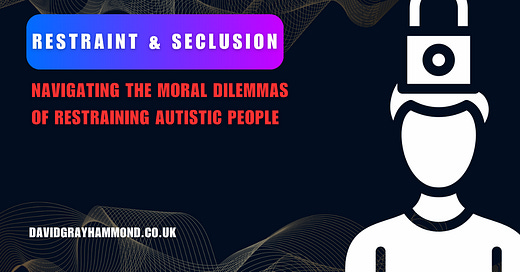The Ethics Of Restraint and Seclusion For Autistic People
When "Last Resort" Becomes Frequent Violation
Autistic people are disproportionately victimised by the use of restrictive practice, also known as restraint and seclusion. Finding accurate statistics on the frequency of such events is tricky. Reporting by the professionals using restrictive practice is inconsistent, and many of those Autistic people subject to it are unable or unwilling to report it for a variety of reasons. I have previously considered the use of such practice in the inpatient setting, but I feel it necessary to take a broader look at the ethics of restrictive practice in general.
What Is Restraint?
Restraint is the intentional limiting of a person's bodily movement. It can be applied by another person (physical restraint), mechanically (through the use of straps and other mechanical devices), or even chemically through the use of sedative medications. In all cases there is a risk of significant injury or death. Such as in the case of Max Benson.
What Is Seclusion?
Seclusion is the restriction of a person's liberty usually via the use of isolation rooms. A person on seclusion is usually removed from the presence of other people by force and as such is likely to have also been restrained.
Is Restrictive Practice Ethical?
In terms of Western culture, there is a legal right to bodily autonomy. This means that a person has a right to use their body as they wish, and not have their body touched or manipulated without consent. In this regard, restrictive practice sits opposed to a person's right to that autonomy.
There are some complications to the assumption of autonomy. Any diagnosis of a condition that means a person does not perform a neurotypical embodiment can he used as grounds to remove a person's bodily autonomy via restrictive practice. The justification is often that a person (in this case, an Autistic person) is behaving in aanner that infringes upon the bodily autonomy of others.
In simple terms, if your behaviour is perceived as a threat to the safety of others, then your right to bodily autonomy can be suspended. This presents a challenge to Autistic people who may be prone to behaviour and performance that can be deemed unsafe.
One of the challenges that arises is in the interpretation of what is necessary for the safety of others. The use of restrictive practice and subsequent denial of autonomy is not broadly standardised and usually the decision to use such practice is at the discretion of those with greater privilege than the person being restrained or secluded.
This raises questions about the perception of behaviour in western culture. Autistic people are regularly victimised by ableist attitudes and the neuronormativity they are founded upon. There is an attitude that one should think, feel, and behave in such a way as to cost systems as little as possible while maximising your production of capital.
This means that the target for neuronormative society is to have people behave in such a way as to benefit neoliberal capitalism. With regard to restrictive practice, it can be assumed that it's use has proliferated not only due to neuronormative standards but also because it costs less to restrain an Autistic person when they are distressed than it does to curate an environment to be more accommodating of their needs.
Further to this is the growth of the autism industrial complex wherein interventions for Autistic behaviours have become a hugely lucrative business. Many organisations produce high profits from the sale and implementation of restrictive practice training. This means there is a financial incentive to normalise the use of restraint and discourage the alteration of environments that trigger the ambiguous spectre of “challenging behaviour”.
We can see, then, that not only do Autistic people find themselves perceived to have less of a right to bodily autonomy, their autonomy is for sale. Financial interests encourage those with privilege to create broader thresholds for the use of restrictive practice on Autistic people and subsequently compound the disproportionate use of force against an already marginalised group.
This forms a foundation from which we can see the unethical nature of restrictive practice across a broad spectrum. It may be argued that these ethical arguments do not only apply to Autistic people, but it should be considered that many of the justifications for such practice favour the liberal use of such practice moreso for Autistic people than for non-Autistic people. It should also not be forgotten that there are wider issues in how Autistic people are perceived and the impact this has on a society that seems such denial of autonomy acceptable.
It is time that systemic powers took more accountability for the unethical applications of such practice and their disproportionate use against Autistic people.





I provided testimony for Washington State legislation on this matter.
The practice is on track to be stopped here. 💕